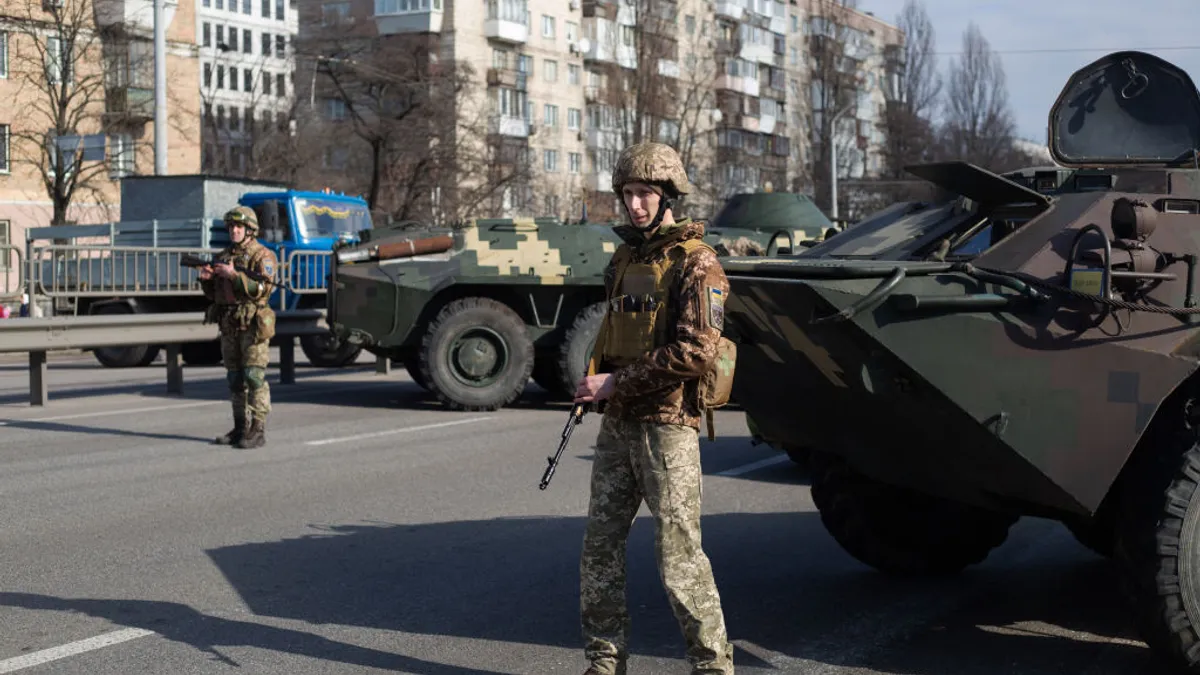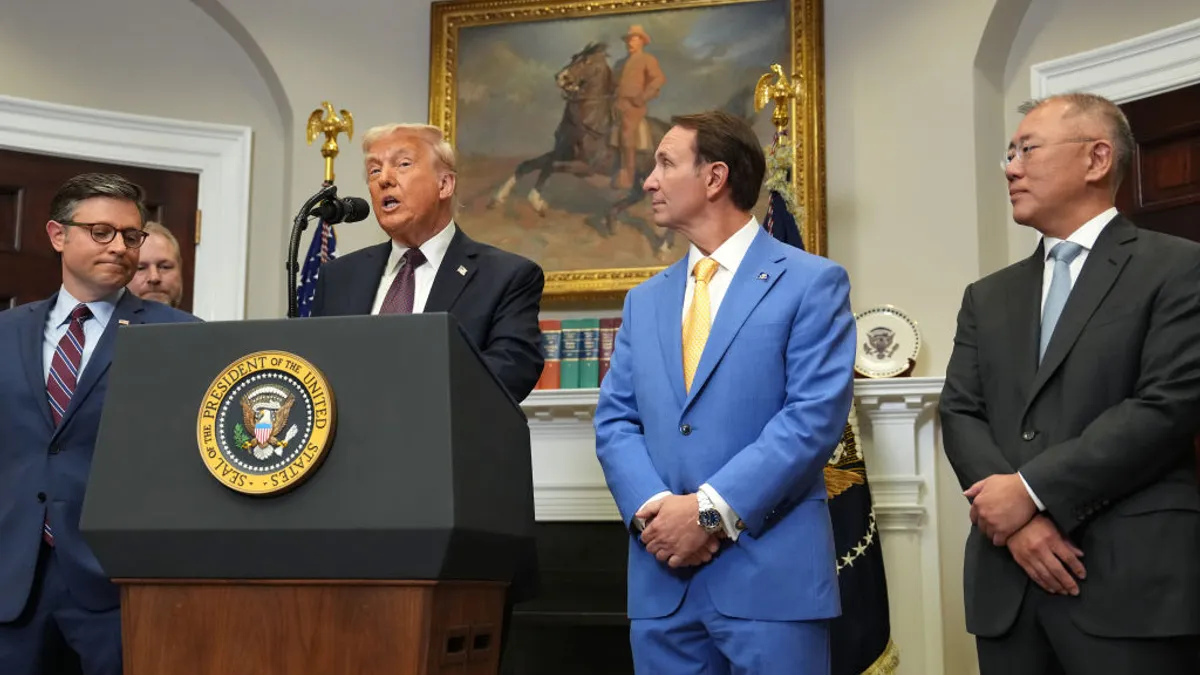Anazette Ray is an associate and Michael Vardaro is managing partner at New York City-based law firm Zetlin & De Chiara. Opinions are the authors' own.
In recent weeks, there has been a long list of companies from all industries spanning construction and engineering to fashion and hospitality, that have announced that they are completely severing ties with Russia, while a host of others have announced a temporary halt. For developers, contractors, engineers and architects that have construction projects in Russia, the question is, “How should we proceed?”
The U.S. initially stated that it was not issuing a total embargo on business dealings and trade relations with Russia in response to the nation’s invasion of Ukraine. Instead, the U.S., along with many other Western nations, issued targeted sanctions.
However, after evidence of war crimes by Russia emerged, President Joe Biden issued an executive order prohibiting U.S. individuals, whether in the states or abroad, from new investments in Russia and prohibiting U.S. individuals from transactions with Russian state-owned entities. This new order is said to not affect existing contracts in Russia, but instead prohibits new ones.
While U.S. companies and individuals can lawfully engage in certain, apparently now limited, business activities involving Russia that are not subject to sanction, these companies need to be wary as to the type of business they will continue doing as penalties for violating U.S. sanctions can be severe. Therefore, it is advised that construction and design-related firms familiarize themselves with potentially applicable sanctions and to perform a thorough due diligence to ascertain whether a particular type of business activity or customers, clients, suppliers or partners may be subject to sanctions.
Information as to what U.S. sanctions have been issued can be found on the U.S. Department of Treasury’s website and by a review of the president’s executive orders. For firms with a multinational presence, it is advised that due diligence be performed as to those respective nations as these new sanctions are being coordinated with members of the G-7 and the European Union.
Additionally, certain states have moved to relieve themselves from construction-related Russian connections. For example, New Jersey is developing a list of prohibited businesses and people with ties to Russia and Belarus.
Construction and design firms on this list will not be able to benefit from contracts with New Jersey state agencies including, but not limited to, public works contractor registration, subsidies from the New Jersey Economic Development Authority, state redevelopment contracts and tax incentives for construction projects within the state.
In addition, New York Gov. Kathy Hochul has issued an executive order ending all state business with Russia. Due diligence for state prohibitions should also be performed.
In determining whether to continue conducting business operations in and business dealings with Russia, considerations that should be taken into account include but are not limited to:
- The source of payments for any services provided in Russia. Russia’s large financial services sector is heavily dominated by state-owned actors; accounting for secondary targets becomes central to the analysis when sanctions directed at intermediary actors come into play. Companies do not want to become secondary targets of U.S. sanctions or be hit with penalties for violating sanctions.
- The ability to obtain supplies and materials needed. Global shipping giant Maersk has suspended Russian bookings; FedEx and UPS announced they will cease operations in Russia. It is reported that export-related sanctions will cut off more than half of Russia’s high-tech imports, restricting the country's access to vital technological inputs.
- The ability to get personnel into and out of Russia. All Russian flights have been banned from the U.S., U.K., E.U. and Canadian airspace.
- The relevant contracts at issue and the rights and remedies contained within same, including any third-party rights such as subcontractors and suppliers.
Next steps
If your company has determined that continuing to do business in the country is not worth the reputational damage or operational hassle, the issue then becomes how to cease operations. This would be governed by the contract(s) entered into.
There are no Russian standard forms of contract for a private construction project, except investment agreements. Moreover, construction contracts for projects in Russia do not always have to be governed by Russian law – read your contract to determine what choice of law was provided for.
If your choice of law is Russian law, it is arguable that the doctrine of force majeure will provide you with contractual relief. Under Russian law, a party is released from liability if failure to perform its contractual obligations as a result of a force majeure event – an extraordinary event which could not have been foreseen and prevented. There is no exhaustive or even approximate list of circumstances that would constitute force majeure events. In practice, Russian law has treated the following events as force majeure:
- Natural disasters.
- War and military actions.
- Riots.
- Embargoes.
There is currently no governing law that provides that sanctions introduced against the Russian Federation may be considered by Russian courts as a force majeure event. Moreover, it is not clear if a war outside of the Russian territory would be considered an act of war force majeure event.
If a force majeure event is of a temporary nature, an obligor can be released from liability for a reasonable period during which it is prevented from discharging its obligations due to the event. Therefore, the obligor will be required to complete its performance once the force majeure event has ceased.
Russian law has not treated the following as force majeure events:
- Breach of obligations by a counterparty (for example, subcontractors, vendors).
- Lack of goods required for work on the market.
- Lack of funds.
Given the above, it may be that the best course of action would be to have an open dialogue with the contracting party on the other side. The intent of Western sanctions was to make it impossible to do normal business in Russia and to create a major economic slowdown within the nation. As such, Russian contracting parties may find it more preferable to put a pause on any contractual performance that would require payments from them, payments that they may not be able to make. The possibility of setting up a mutually agreeable pause on relations may very well be a realistic option.
Recouping money
Keep in mind, if you are owed money for any Russian-related contracts, there is a likelihood that you may be unable to recover any such monies. There is no doctrine of binding precedent in Russia. As such, court decisions are decided on a case-by-case basis.
The Russian courts can give diverse judgments and Russian judges are hand-picked by Putin. Additionally, in response to various sanctions levied against it, Russia is enacting a series of laws to protect its interest in favor of Russian entities.
For example, Russia has recently passed a law providing that the Russian courts have exclusive jurisdiction over certain disputes involving Russian-sanctioned individuals and entities, and the Russian Supreme Court has enforced this law. Orders entered by arbitrators or foreign tribunals may be unenforceable in Russia, and the party seeking enforcement can be subject to fines by Russia.
Accordingly, it can be concluded that any attempts by Western companies seeking to recoup monies from Russian entities and individuals, as a result of the recent political climate, may be deemed to be unfair to these Russian entities and individuals by the Russian courts.




















